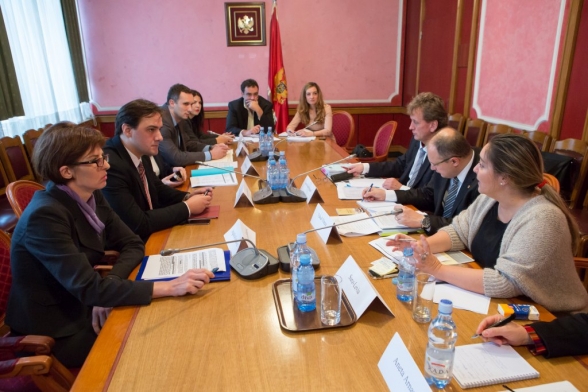The aim of the visit, within Round IV evaluations, which focuses on combating corruption in relation to MPs, judges and prosecutors, is the collection of information necessary for the finalization of the Evaluation Report on Montenegro, which is one of the stages in the process of evaluation of the member states of GRECO (Group of States against Corruption). Information concerning primarily the work of parliament, strengthening its legislative and oversight role, the implementation of rules relating to conflict of interests, assets and income, transparency, as well as the adoption of the Code of Ethics and Integrity Plan. The report will provide an assessment of the effectiveness of measures taken by the authorities of Montenegro to prevent corruption in relation to MPs, judges and prosecutors, will include an analysis of the situation in the country, identify any gaps and make recommendations for further improvements.
Secretary General informed participants on the procedures in the legislative and oversight activities of the Parliament of Montenegro, especially on actual measures aimed at strengthening the oversight role of Parliament in the field of prevention and combating of corruption in relation to MPs. In this sense, Davidović informed GRECO experts with the obligations of MPs in terms of notification about the possible existence of private interests, as well as the reporting of assets, income and gifts, and regulations pertaining to salaries and wages for MPs.
GRECO experts were particularly interested in work on the adoption of the Code of Ethics for MPs. Davidović informed that Working group for drafting the Code of Ethics was formed, which held six meetings so far, and that the work on the draft of this document is closing.
The meeting also discussed the monitoring of the implementation of conclusions adopted by the committees and the Parliament, the integrity plan and other measures envisaged by the Action Plan for strengthening legislative and oversight role of Parliament.
When it comes to transparency in the work of parliament, particularly the legislative process, it was pointed out that the work of the Parliament and its committees is, as a rule, public, and that all proposals for the law, whether the proponent is the Government or an MP, as well as all the supporting acts, are regularly published on the website of the Parliament.









